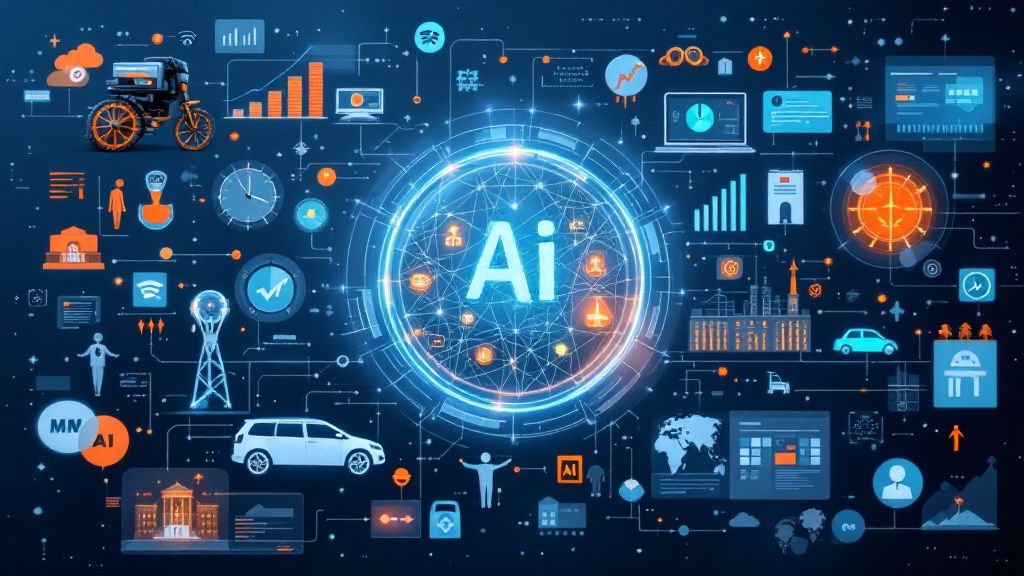Artificial intelligence is transforming the landscape of industries worldwide, promising a revolution in how we live and work. You'll notice that AI isn't just a concept of tomorrow but a powerful tool in today's world. By implementing AI in business, you can streamline operations, enhance creativity, and provide personalized customer experiences. The future of artificial intelligence holds enormous potential, offering innovative solutions and optimizing various fields. Embracing AI for business can help unlock efficiencies and drive growth in ways previously unimaginable. As AI continues to evolve, it becomes an essential component in harnessing data to foster innovation and competitive advantage.
Understanding the Basics of AI
Artificial intelligence, at its core, consists of computer systems designed to perform tasks typically requiring human intelligence. These tasks include learning, problem-solving, and language understanding. As you explore AI, it becomes clear that this technology mimics human-like capabilities, enabling machines to learn from data. A fascinating aspect of AI for business is its ability to improve decision-making processes, offering you powerful insights derived from vast data sets.
Machine learning, a subset of AI, focuses on algorithms that allow computers to learn independently. Implementing AI in business involves leveraging machine learning to analyze data patterns and automate repetitive tasks. This gives you more time to focus on strategic initiatives. By understanding the basics of AI, you can appreciate how these technologies are transforming industries.
In the next few years, the future of artificial intelligence is predicted to radically change industries by automating numerous processes and creating new opportunities for growth. This bold prediction underlines the significance of embracing AI's potential now. Your understanding of its fundamentals sets the stage for harnessing AI's capabilities efficiently both today and as it evolves.
A strong foundation in AI enables you to anticipate and adapt to upcoming trends. With this knowledge, you can integrate AI solutions holistically, fostering innovation and gaining a competitive edge. Equipping yourself with these basics is crucial for leveraging the full potential of AI technology in your ventures.

Real-World Applications of AI
Artificial intelligence is seamlessly integrated into various sectors, reshaping how you experience daily life. In healthcare, AI enhances diagnostic accuracy and tailors treatment plans to individual patients through data analysis. These personalized approaches improve patient care and efficiency. In retail, AI-driven recommendation systems suggest products you might like based on previous purchases, making shopping more intuitive and convenient.
AI's presence in finance has revolutionized fraud detection and customer service. Algorithms quickly analyze transaction patterns, identifying anomalies that might signal fraud. Additionally, chatbots, powered by AI, provide instant customer support, improving service quality and accessibility. Implementing AI in business can streamline operations and ensure you are better protected against security threats.
To truly grasp the real-world potential of AI, you need to shift your mindset from seeing it as a futuristic novelty to recognizing its current transformative impact. This new perspective helps you fully appreciate AI for business applications, where it drives growth and innovation. In the future of artificial intelligence, embracing these changes positions you to leverage AI capabilities optimally.
AI continues to evolve, influencing industries like transportation, where autonomous vehicles promise to enhance safety and reduce traffic congestion. In your day-to-day life, AI makes tasks more efficient by automating processes and offering data-driven insights. This integration underscores the importance of adapting to AI advancements and utilizing its applications to your advantage.
The Evolution of Machine Learning
Machine learning, a key component of artificial intelligence, has undergone significant transformations since its inception. Initially conceptualized in the mid-20th century, machine learning's ideas were inspired by early theories on algorithms and computational models. Your understanding of these changes enriches how you apply machine learning in various contexts. By analyzing historical advancements, you can leverage machine learning's power for future developments, particularly in enhancing efficiency and innovation across sectors.
Tracing its evolution from the 1950s, machine learning has expanded from simple pattern recognition to complex predictive analytics. Today, it integrates neural networks and deep learning techniques, enabling more nuanced data handling. Implementing AI in business, machine learning enhances predictive capabilities and drives decision-making processes. In the future of artificial intelligence, embracing machine learning's sophisticated capabilities will be crucial for gaining competitive advantages in technology-driven environments.
Through continuous evolution, machine learning now empowers real-time data processing and analysis. Whether through AI for business or broader applications, the impact of machine learning on tasks like customer segmentation and personalized marketing strategies is profound. This reflects a shift towards leveraging intelligent systems for strategic advantage, highlighting the adaptability and scalability of machine learning solutions in shaping tomorrow's artificial intelligence landscape.

Deep Learning Breakthroughs
One of the most significant advancements in artificial intelligence comes from deep learning. This branch of AI mimics the human brain's neural networks to process large amounts of data quickly and accurately. You'll find that deep learning is behind many of the intelligent systems you interact with today, from voice assistants helping manage daily tasks to image recognition software improving security systems.
Deep learning's application across industries showcases its transformative power. In healthcare, it's revolutionizing diagnostics by identifying patterns in medical images that might elude human doctors. Did you know? Healthcare institutions have started integrating AI, including deep learning, into their systems to enhance patient care and improve diagnostic accuracy. This reflects a growing trend toward data-driven decision-making.
In the landscape of business, deep learning contributes significantly by optimizing supply chains and refining customer recommendations. Implementing AI in business with deep learning provides insights from consumer behavior, guiding strategic decisions that drive success. As you explore the future of artificial intelligence, deep learning initiatives stand at the forefront, shaping business dynamics and consumer interactions.
The future of deep learning holds immense promise, with continuous breakthroughs anticipated. As algorithms become more sophisticated, you'll see new opportunities arise for AI for business applications. This will likely lead to automation of complex tasks, opening new avenues for innovation. Recognizing these deep learning breakthroughs is essential for staying ahead in an increasingly AI-driven world.

AI in Everyday Technology
Artificial intelligence subtly weaves its way into your daily life, powering technology you use regularly. From personalized streaming recommendations to smart home devices controlling lighting and temperature, AI enriches your experience by predicting your preferences and habits. These intelligent systems learn from your behavior, making interactions more intuitive and tailored.
Digital assistants such as Apple's Siri and Amazon's Alexa exemplify AI's everyday ubiquity, allowing you to navigate tasks hands-free. They answer queries, manage schedules, and even control other devices, streamlining your routines. While many believe that AI is best left to business applications, there’s a strong case for its everyday use in simplifying personal technology and enhancing convenience.
AI also plays a crucial role in enhancing smartphone functionalities, such as facial recognition for security and augmented reality for immersive experiences. These advancements demonstrate AI's capability to refine technological interactions, making them more secure and engaging. The future of artificial intelligence promises even more innovations to simplify and enrich your daily life.
Implementing AI in business and daily technology operates on similar principles: efficiency and user-centric design. As AI continues to integrate into everyday devices, its potential expands, offering new conveniences and possibilities. This ongoing evolution signifies the importance of understanding AI's role in shaping the technology and lifestyle of tomorrow.

Ethical Considerations in AI Development
Artificial intelligence development raises important ethical questions, especially as technology becomes more pervasive in daily life. Issues such as privacy, consent, and bias are central considerations that need addressing. As you engage with AI systems, it's clear that ensuring transparency and ethical deployment is crucial. Balancing innovation with responsibility helps maintain trust and societal well-being as AI evolves.
Fairness and bias in AI decision-making processes are significant concerns. One of the most frequently asked questions about AI ethics is how algorithms can be designed to minimize bias while maintaining effectiveness. Here’s the answer: rigorous testing, diverse data sets, and ongoing monitoring are essential to develop fair AI systems, ensuring that they reflect diverse perspectives and reduce unintended discrimination.
There's a pressing need to safeguard data rights as AI systems collect and analyze personal information. Businesses implementing AI must prioritize secure data handling and user privacy. As AI for business expands, establishing clear guidelines for data usage is imperative to prevent misuse and protect individual rights without inhibiting technological progress.
The future of artificial intelligence must incorporate ethical frameworks to guide its development. As AI technologies advance, these considerations will become increasingly important to foster responsible innovation. Understanding and actively addressing these ethical challenges ensures that AI continues to benefit society as a whole.


.jpg)

.jpg)
.webp)
.webp)
.webp)


.svg)









